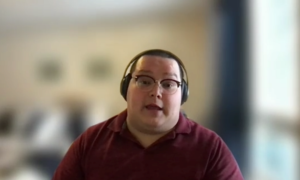Lakehead University Indigenous Graduate Student shares inspiring education journey

By Rick Garrick
THUNDER BAY — Pays Plat’s Clifford Mushquash shared how his career goals have changed from law to social work to public health during his March 17 virtual presentation at Lakehead University’s Indigenous Graduate Student Speaker Series.
He had originally pursued a seven-year plan in the 2000s to do an undergraduate degree and then go on to law school, but his views changed after he worked at the Sioux Lookout Out of the Cold emergency overnight shelter and food bank for nine months after returning home due to health issues in 2009.
“That opportunity really changed my life,” says Mushquash, a Masters of Public Health student with a specialization in Indigenous and Northern Health at Lakehead University. “It really opened my eyes to a lot of things— it changed my opinion on homeless populations, it helped me to understand systemic barriers— those weren’t talking pieces I was accustomed to engaging in.”
Mushquash says he also worked in a variety of health and human service jobs before deciding to study social work at Lakehead University in 2016 to stay close to his family, with the idea of eventually continuing on to study law. He graduated with a Bachelor of Arts in Sociology and an Honours Bachelor of Social Work in 2020, but after approaching faculty members and Elder Gerry Martin for advice, he applied to both the Masters of Public Health and Masters of Social Work programs and eventually decided to pursue the Masters of Public Health program.
“I really feel this is what I’m supposed to be doing and these struggles that I’ve had in the last 10-15 years all makes sense now,” Mushquash says. “It means something and it wasn’t for naught. I didn’t understand why I was going through all those things at the time but it makes sense now and I can really grab ahold of that and go forward with it.”
Mushquash says the Masters of Public Health program has students from a variety of backgrounds, including nurses and people from the hard sciences.
“Public Health … historically was an online program, and only within the last few years has that program been offered on campus,” Mushquash says. “So all of the courses I am taking have been offered online before — the professors, the instructors have all taught online before so fortunately for them there wasn’t much of a learning curve. Certainly from our [student] perspective, we don’t notice any kind of hangups, there haven’t been any growing pains that we could see. It’s been really smooth in that regard but certainly the stress of the pandemic we’re not immune to.”
Mushquash says there was a good response to his presentation, noting that the purpose of the Indigenous Graduate Student Speaker Series is to encourage undergraduate students to consider graduate studies.
“For some people, they may not have ever considered university as an option so for them undergraduate studies is their goal, but there is more that can be done after the undergraduate level,” Mushquash says. “[This series] gives them an opportunity to hear from somebody who has a similar background to them that is going down that path themselves to learn from their challenges and their achievements.”
The Indigenous Graduate Student Speaker Series previously featured presentations by Masters of Science in Management student Nathaniel Anderson on March 1 and Masters of Science in Management Accounting student Cheryl Ogima on March 10. Masters of Arts, Social Justice student Joseph Duncan is scheduled to deliver his presentation on March 24.


